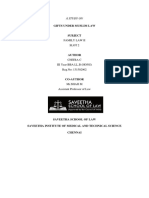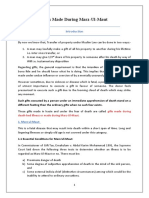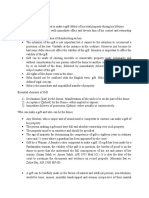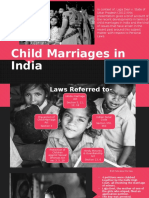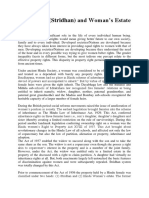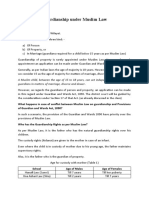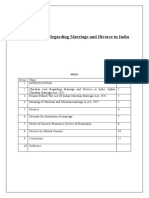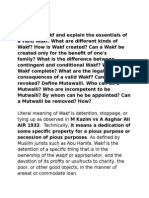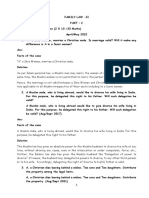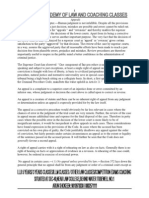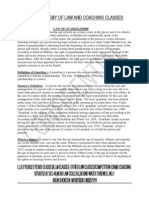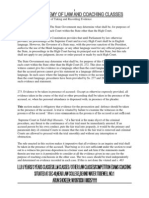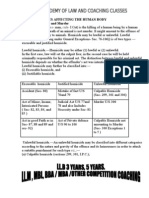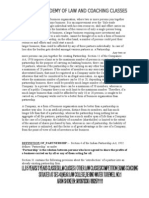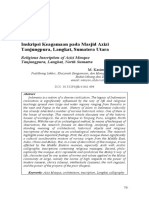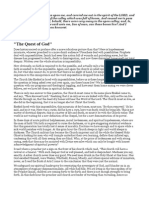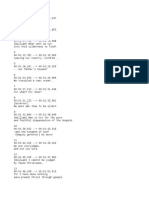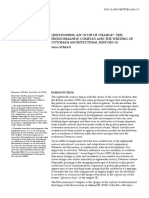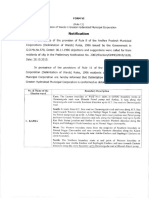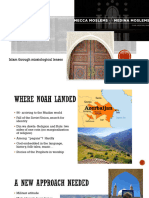LAW OF GIFT Muslim LAw
LAW OF GIFT Muslim LAw
Uploaded by
Arun ShokeenCopyright:
Available Formats
LAW OF GIFT Muslim LAw
LAW OF GIFT Muslim LAw
Uploaded by
Arun ShokeenCopyright
Available Formats
Share this document
Did you find this document useful?
Is this content inappropriate?
Copyright:
Available Formats
LAW OF GIFT Muslim LAw
LAW OF GIFT Muslim LAw
Uploaded by
Arun ShokeenCopyright:
Available Formats
1
LAW OF GIFT (HIBA) Gift is a generic term that includes all transfers of property without consideration. In India, Gift is considered equivalent to Hiba but technically. Gift has a much wider scope than Hiba. The word Hiba literally means, the donation of a thing from which the donee may derive a benefit. It must be immediate and complete. The most essential element of Hiba is the declaration, I have given. Concept of Hiba :- The Muhammadan Law defines the Hiba or gift as a transfer of a determinate (amount of) property without any exchange from one person to another, and accepted by or on behalf of the latter.1 Until acceptance, the gift has no operation. A further condition relating to it is that the donor should complete his intention by delivering possession of the property to the donee. Until then, property remains entirely at the disposal of the donor and upon his death, it will descend to his heirs. If possession is given afterwards in pursuance of the gift, they need not be i renewal of the gift. From the above, it is clear that under Muslim law, a gift is called Hiba. When Muslim transfers his property through gift, the transfer is called Hiba. The religion of the person to whom the gift is made, is not relevant. If the transferor Muslim, the gift is Hiba. Thus, where a Muslim makes a gift of his properties in favour of a Hindu, the gift is nonetheless a Hiba. In India, the subject of gifts is governed by the Transfer of Property Act, 1872. But, chapter VII of the Transfer of Property Act does not apply to Muslim gifts or the Hiba. The reason is that although there is no difference in the gifts made by non muslim and a Hiba in so far as its basic nature is concerned yet, the formalities of Hiba are different from that of a gift made by any non-Muslim. As the rules of Muslim personal law were to be in conflict with the general rules framed for all persons in India, it was deemed fit to exclude Hiba, or the gift made by a Muslim, from the operation of Chapter VII of the Transfer of Property Act. Moreover, the Shariat Act, 1937, includes gift as one of the matters in which rule of decision should be Muslim personal law if the parties are Muslims. The result is that gifts made by a non-Muslim in India are governed by the provisions of the Transfer of Property Act, 1872, whereas the gifts made by Muslims are governed by the Muslim personal law. Constitutionality of Hiba :- The Transfer of Property Act, 1882 contains besides general principles relating to transfer of property-the laws relating to sale, mortgage, charge, lease, and exchange, transfer of actionable claims and gifts of property. All the Chapters of this Act except that on gifts are applicable to the Muslim. As regards the general principles relating to disposition of property contained in Chapter 2 of the Transfer of Property Act, the Act declares that nothing in the second Chapter of this Act shall be deemed to affect any rule of Mohammedan Law.This exemption may appear to be discrimination on the ground of religion which is against the Article 14 (i.e., right to equality) of the Indian Constitution. But in Bibi Maniran v. Mohd. Ishaque, court now made it clear that this exemption is constitutional and lawful. Muslim gift or the Hiba has been associated and has also been included in the Shariat Act, 1937, to be regulated only by Muslim personal law. Therefore, the exemption under section 129 of the Transfer of Property Act does not violate Article 14 of the Constitution of India. The
courts have held that the rules of Muslim law regarding gifts are based on reasonable classification and there is no discrimination in allowing a separate law for gifts made by Muslims. The Kerala High Court has also held that section 129 of the TPA, read with Article 14 of the Constitution of India, exempts only religious gifts. It does not protect a non-religious, i.e., secular gift made by a Muslim. Definition of Gift.Under Muslim law, a person is allowed to lawfully make a gift of his property to another during his life time or he may transfer it by way of will which will take effect after his death. The first is called a disposition inter vivos and the latter a testamentary disposition. A disposition inter vivos is unfettered as to quantum. a testamentary disposition is limited to 1/3 of the net estate. Muslim Law permits a man to give away the whole of his property during his life time, whereas only 1/3 of it can be bequeathed by will. A hiba or simple gift inter vivos (between living person) literally means the donation of a thing from which the donee may derive benefit.1 In its technical sense, it is defined as unconditional transfer of property. made immediately and without any exchange or consideration, by one person to another and accepted by or on behalf of the latter. It is the conferring of the property without consideration. According to Mulla Gift is a transfer of property, made immediately and without any exchange, by one person to the other and accepted by or on behalf of the latter. Since Muslim Law views the law of the gift as a part of the law of contract, there must be an offer (Ijab) and an acceptance (qabtil) and delivery of possession (qabza). In P. Kunheema tlmma v. Aayssa Urnma, Kerala High Court held that the requirements of a gift of immovable property under the Muslim Law are : (1) declaration by the donor (2) acceptance by the donee and (3) delivery of possession by the donor to the donee. There is, however, no consideration and this fact coupled with the necessity to transfer possession immediately distinguishes gifts from sale. It may be noted that gift of the corpus of a thing is called hiba while gift of only the usufuructs of a property is called ariya. In Smt. Hussenabi v. Husensab Hasan offer of gift was made. The offer was made by grandfather to his grand children. The grand children were living with him. On behalf of the minor children the acceptance was made by the donor. But no express or implied acceptance of gift was made by major grand son. The Karnataka High Court held that when the three essentials are not complete it cannot be a complete gift. The gift-deed was valid in so far as the three minor children are concerned. As regards the gift in favour of the major sons was set aside. Requisites of gift. The requisites or essentials of a valid gift are four in number, as follows: 1. Parties. 2. Subject. 3. Extent,and 4 Formalities or mode of gift.
Parties to a gift.The parties to a gift transaction are two: (i) the donor, i.e., the person who makes the gift. (ii) The donee, i.e., the person who takes something as gift. (i) The donor.The capacity of making a gift, like any other contract, depends on the following conditions. The donor must have a donor, who has the following qualifications, has capacity to make a Hiba: Mohammedan: A donor must be a Mohammedan. Sex: A donor may be a male or female. Status: A donor may be married or unmarried. Age of Majority: A donor must have attained the age of majority. The age of majority is the age prescribed under section 3 of the Indian Majority Act, 1875 as amended in 1999, which now means eighteen years. Ownership of Property: The person making a Hiba must be the owner of the property which is the subject matter of the Hiba. In other words, the ownership of the property must be with the donor, at the time of making a gift. A gift by a widow who is in possession of the property of her husband in lieu of dower cannot make a gift of such property. Free Consent: A gift made under compulsion is not valid but voidable. Free consent of the donor must be associated with the gift when a gift is made by a pardanasheen lady, the proof of independent outside advice is the usual mode of discharging the burden by the donee that the gift was free from compulsion. The gift will be valid, if the pardanasheen lady had the advantage of independent advice, and the contents of the deed were fully explained to and understood by her. In Kaireern Biwi v. Mariarn Biwi Their Lordships of Madras High Court followed the view laid down by the Privy Council in Faridimnissa v. Mukhtar Ahmed, and observed: A gift deed executed by pardanashin lady stands in a peculiar position. The deposition made must be substantially understood and must really be the mental act, as its execution is the physical act of the person who makes, it if however, the settlors freedom and comprehension can be otherwise established, or if, the scheme and substance of the deed were themselves originally and clearly conceived and desired by the settlor, and were then substantially embodied in the deed. There would be nothing further to be gained by independent advice. They must satisfy the Court that the deed has been explained to and understood by the party thus under disability, either before execution, or after it under circumstances which establish adoption of it with full knowledge and comprehension.
(i) (ii) (iii) (iv)
(v)
(vi)
It may be noted that the protection given by the rule relating to the pardanashin woman cannot plainly be the exclusive privilege of the class commonly known as pardanashin. The rule regarding transactions by pardanashin ladies applies equally to illiterate and ignorant woman though not pardanashin. A pardanashin lady is fully competent to dispose of her property by way of executing a document. In the case of a document executed by a pardanashin lady, intelligent execution must be proved. The extent and character of the explanation required must depend in the circumstances, The parda with its inhibitions may be an additional feature or element in the case but the real reason behind the rule is lack of understanding and appreciation of what an illiterate woman without independent advice has done.A person in insolvent circumstances can make a gift provided he has a bona fide intention to give and the act is not merely intended to defraud the creditors. (ii) The Donee.Any person capable of holding property, which includes a juristic person, may be the donee of a gift. Thus sex, age, creed or religion are no bar to the taking of a gift. A Muslim may make a lawful gift in favour of any non-Muslim, for example, Christian or Hindu. However, the donee must be in existence at the time of making the gift. in the case of a minor or a lunatic, possession must be handed over to the legal guardian. A donor D desires to make a gift of an immovable property to M, a minor. D must handover the possession of the property of Ms father, the legal guardian. If possession is handed over to Ms brother, of Ms mother, the gift would be void. A donee, who has the following qualifications, has capacity to take a Hiba: Mohammedan: A donee may be a Mohammedan or non- Mohammedan. After the completion of the gift, to a non-Mohammedan, the property will be subject to the personal law of the donee. Sex: A donee may be a male or female. Status:A donee may be married or unmarried. Age of Majority: A donee may be a major or minor. Soundness or unsoundness of mind: A donee may be an insane. But when a gift is made to a minor or a person of unsound mind, the gift will be complete by the delivery of possession to the guardian of the minor or of the person of the unsound mind. Existence of a donee or Child in Womb: A Hiba cannot be lawfully made in favour of an unborn person. Such a Hiba to unborn person is invalid, with one exception. For example, if the donor makes a gift of some property to a donee and after his death to donees son who is not in existence, such gift will be void. But a gift to an unborn
(i)
(ii) (iii) (iv) (v)
(vi)
donee, who is in womb and is born within 6 months of making of the gift, is valid. Therefore, the child in its mothers womb is a competent donee. Although the child in mothers womb has no worldly existence yet, in the eyes of law it is regarded as a living person. Under the Muslim law, a gift in favour of a child in the womb is valid provided such child is born alive within six months from the date on which the gift was made. Gujarat High Court in Ibrahirn Shah Mohantinad v. Noor Ahnzad Noor Moham,nad. In this case the Court held that a father can lawfully make a gift to his minor son. In the present case the boys grandfather, next entitled after the father to be the legal guardian of the minors property was still alive. The Court held that even though under the Muslim law, the mother is not the natural guardian of the property of her minor son. When the father and grandfather are both alive, she had the capacity, with the consent of the legal guardian to take symbolic possession of the property on behalf of the minor (vii) A Hiba cannot be made in favour of a dead person: When a widow makes a Hiba of her Mehr to her deceased husband, though such a transaction if called Hiba-a-Mehr. it is in fact a unilateral foregoing of the right to Mehr by the widow to which the principle of Hiba does not apply. And a gift of future usufruct to unborn person is valid provided the donee is in being at the time when interest opens out of heirs. Joint donees: A Hiba jointly in favour of two or more persons is not ipso facto invalid. In other words, a gift may be made jointly to two or more persons but the shares of each should be clearly specified. For example, if a gift of a property capable of being divided is made to two or more persons without specifying their shares or without dividing them, then the gift is not valid kut if such donees themselves make any mutual arrangement and tale possession of their individual shares, then the gift is valid. Gift of usufruct to unborn person.Formerly it was said that a gift of future usufruct to unborn person shall not be valid. Later on, this opinion, was not adopted. In Ghulanz Huseins case it was held that a gift of future usufruct to unborn persons is valid provided that the donee is in being at the time when interest opens out for heirs. In this connection, the provisions of the Transfer of Property Act may be noted. (i) if the gift to an unborn person is proceeded by a proper disposition, the gift shall be of the whole residue.; (ii) the gift will not offend the rule against perpetuities; (iii) if a gift is made to a class of persons with regard to some of whom it is void under (i) or (ii), the gift fails in regard to those persons only and not in regard to the whole class; (iv) if a gift to an unborn person is void under (i) or (ii) any gift intended to take effect after such gift is also void.
(viii) (ix)
(x)
(xi)
Fiduciary relationship.When the donee stands in a fiduciary relationship to the donor or the relation between the parties is such that the donee is in a position to dominate the will of the donor, in case of dispute, the presumption of undue influence arises and on that account such a gift can be held to be void and in such circumstances it is incumbent on the donee to satisfy the Court that the donor had competent and independent advice in making the gift. In Musa Miya v. Kadar Bux, the Privy Council was required to consider a case where it was alleged that a grandfather had made a gift of property to his grandsons, but had done nothing further to complete the gift, not only was there no deed executed and no mutation effected, but it was proved that the grandfather had not relinquished but continued to manage the property till his death, without in any manner having indicated that he regarded himself as a trustee for his grandsons or that he was in possession of the property on their behalf. The only question before the Privy Council was whether the case fell within the exception which provided that a gift by a father or other guardian of a minor does not require a change of possession and their decision was that it did not. It was held that it is a well established principle of law that a gift in favour of a minor by any person other than the father or guardian of such minor must be accompanied with delivery of possession to the father or guardian of the minor.
2: Subject-matter of a Hiba (Mouhub) :- A Muslim can make a Hiba of the whole of his/her property. Every form of property or right which has some legal value may be the subject-matter of a Hiba.1 However, the property must be transferable under section 6 of the Transfer of Property Act, 1882. As a matter of fact, any property (mal) over which ownership may be exercised, may be transferred through a gift. Tangible as well as intangible property may be the subject matter of a gift. Whatever is made according to Muslim jurisprudence can be lawfully subjects of gifts at Muslim law. Following mentioned are some types of property or right which may constitute the subject-matter of a gift. 1. Gift or corporeal or incorporeal property: A Hiba or gift may be made of corporeal as well as incorporeal property. All actionable claims or any other incorporeal property may be the subjectmatter of gift. The following subjects may constitute the subject matter of gift: (i) Negotiable instrument, (ii) Government promissory notes, (iv). Property under attachment, (v) Right to receive an annuity charged on land, In all above cases, the donor should clearly show his intention to divest himself in praesenti of the property and confer it on the donee.
2. Gift of equity of redemption: Gift of an equity of redemption is valid. When a person (mortgagor) takes some loan from the other (mortgagee) by securing his immovable property, he has an equitable right to redeem his property after paying the loan. Mortgagors this right is called his equity of redemption. Equity of [redemption is mortgagors beneficial interest and is owned by him. A mortgagor can make a gift of his right of redemption. Where a gift of the equity of redemption is made, the donee becomes entitled to redeem the mortgage from the mortgagee satisfying the debt. 3. Gift of Insurance Policy: Gift of insurance policy is valid. The policy holder, whether he is Muslim or non-Muslim, has an interest in the sum insured. The olicy-ho1dr owns this interest. However, this interest is his contingent interest. s gift of contingent interest is void under Muslim law, the gift of insurance policy cannot be made by a Muslim policy holder under Muslim law. But, under section 38(7) of the Insurance Act, 1938, gift (assignment) of insurance policy is lawful. In Sadiq Au v. Zahida Begum,1 the court held that the expression, any law or custom having the force of law to the contrary, in section 38(7) of the Insurance Act, 1938 are wide enough to exclude the contrary rules of Muslim law on gifts. The result is that where a Muslim makes a gift of his insurance policy the gift is valid because the Insurance Act, 1938, would be applicable and not the contrary rules of the Muslim law. 4. Gift of Debt: A release of a debt by the creditor to the debtor may be made. Such release amounts to a gift. 5. Gift of existence property only: Only the existent property may be the subject of a gift. The property or a right, which is not in existence, cannot be the subject of a gift. For example, a gift of the fruit that may be produced by the donors palm tree is not valid. 6. Gift of Dower: Gift of dower by a Muslim wife in favour of her husband is valid. This is called as Hiba-e-Mahr, i.e., gift of dower. Dower is a debt which is due to the wife against her husband. Right to claim a debt is an actionable claim, therefore, wifes right to dower is her actionable claim and as such it may be a subject matter of Hiba. But it should be made only to the husband. Gift of dower to any person other than husband is void. 7. Gift of Service: The subject matter of gift must be some property whether tangible or intangible. Services or the natural love and affection are not properties. Therefore, they cannot be all subject-matter of a Hiba. 8. Gift of Mortgage property: A property which is under a mortgage may also be lawfully gifted. In this respect, the courts have held as following thing, (a) when a mortgaged property is in mortgagees possession the equity of redemption may be lawfully gifted. (b) where a mortgaged property is gifted with a condition that the mortgage be paid of from the income of the property the gift will be void. (c) when the property is subject to usufructuary mortgage, it can form the subject of a valid gift.
Doctrine of Mushaa (Hiba-bil-Mushaa). :- There is no unanimity of opinion amongst different schools of Muslim Law on the question of the validity of the doctrine of mushaa. Shafei and Ithna Ashari Shia schools have recognized this principle. According to these schools a gift of undivided property can be validly made. In such cases it is necessary that the donor must give to the donee the possession of the undivided property. On the other hand, Hanafi school does not recognize the doctrine of musha. According to Hedaya a gift of a part of a thing which is capable of division is not valid unless the said part is divided off and separated from the property of the donor; but the gift of the property which cannot be divided is valid. Meaning.Musha is an Arbic word derived from saayu meaning undivided share in a property. The cule as to Musha, as laid down in Hedaya., is a gift of a part of a thing which is capable of division is not valid unless the said part is divided off and separated from the property of the donor where as a gift of an indivisible thing is valid. . In Aftab Hussain v. Smt. Tayebba Begum., it was ruled that where some of the Mohammedan co-sharers are in actual joint possession of a house, their possession must be deemed to be, in the eye of law, on behalf of all the co-shares including the one who is not in actual possession and the possession of the latter must be deemed to be constructive possession. If there has been a gift of his undivided share in house by a co-sharer who is in construetive possession and the donor has also divested himself of the proprietary right at the time of making the gift and delivered constructing possession to the donee, then the gift is not hit by the doctrine of Mushaa and is valid in law. In a later case it was said that doctrine of Mushaa was not opposed to justice, equity and good conscience.The validity of a gift of Mushaa must be tested in the same way as of any other gift. Kinds of Mushaa.A Mushaa may be either (i) in a property incapable of division, or (ii) in a property capable of division. (i) Musha in a property incapable of division.A gift of an undivided share in a property (mushaa) which is not capable of division is valid. A, who owns a house, makes a gift to B of the house and of the right to use a stair-case by him jointly with the owner of an adjoining house. The gift of As undivided share in the stair-case, though it is a gift of a mushaa, is valid, for a stair-case is not capable of division.A gift of a share in the business of a Turkish bath is valid, for the hammam, is not capable of division and would be ruined, if it were divided by metes and bounds. (ii) Mushaa in a property capable of division. If the property is capable of division, the gift of mushaa will be irregular though not void under Hanafi Law. It means that it can be rendered valid by subsequent partition and delivery. However, in certain cases a gift of mushaa even in a property capable of division is valid. Such cases are as follows 1. Gift by one heir to another.Gift of mushaa by a heir to his co-heir is valid. Where a Muslim
woman dies leaving a mother, a son and a daughter, the mother can make a valid gift of her share to both or any of them. 2. Gift of a share by a co-sharer in a Zarnindari or Talauqa.This is valid because in such a case, what is gifted is the right to receive and to collect separately a definite share of produce or rent of the share. Thus, if A and B are co-sharers in a Zamindari, each having a well defined share in the rents of undivided land, and A makes a gift of his share to B, there being no regular partition of the Zamindari, the gift is valid. However, after the abolition of the Zamindari system in India, this exception has no practical significance. 3. Gift of share in a company is valid. 4. Gift of a share in the freehold property in a large commercial town is also valid. 5. Gift of an undivided but divisible property to two or more persons jointly is valid. X m kes a gift of a house to A and B in equal shares as tenants in common. The property is not divided off and, although their shares are clearly defined, possession of their specific shares is not given to A and B. The tenants are given notice that the properties have been given away to A and B, to whom rent is to be paid. Such a gift is valid. 6. Gift of a Mushaa with stipulation that the donee shall pay certain periodical sums to someone is not subject to impediments by the law of mushaa. Formalities and modes of Gift.The most important requisite of hiba is that it must satisfy the rules laid down by Muslim Law for making a gift. Mere presence of a donor and a donee; their ability to make and accept the gift and the existence of a valid subject of gift will not have the effect of completing the transaction. It will have to satisfy certain formalities, which in facts, are the real tests of the validity of a gift transaction. Three Conditions.The act of making a gift should fulfil the following three conditions These are also known as Essentials of a Gift, (.i declaration by the donor; (ii Acceptance by the donee; and (iii) Delivery of possession by the donor and taking of possession by the donee. Even when the declaration and acceptance are not expressed in words, so long as the intention is evidenced by conduct, it would be sufficient. (i ) Declaration of gift.There must be a clear and unambiguous intention of the donor to make the gift. When there is no real or bona fide intention on the part of the person making of the gift, the alleged gift will be void. It is on this basis that it has been held that a gift with intent to defraud creditors is voidable at the option of the creditors. There must be the bona fide intention of divesting himself in praesenti of his proprietary title in the property gifted by the
10
donor. The intention must be real and bona fide and the manifestation or the declaration of such intention must be clear and unambiguous. The declaration of the gift must be made voluntarily. It is necessary that the donor must be a free agent in making the gift. If the declaration of gift has been made under coercion, fraud, misrepresentation or undue influence such a gift is not valid. The Supreme Court of India in Mahboob Sahab V. Syed Ismail,AIR 1995 SC 1205 held that though gift by a Mohammedan is not required to be in writing and consequently need not be registered under the Registration Act; a gift to be complete, there should be a declaration of the gift by the donor; acceptance of the gift, expressed or implied, by or on behalf of the donee, and delivery of possession of the property or the subject-matter of the gift by the donor to the donee. The donee should take delivery of the possession of that property either actually or constructively. On proof of these essential conditions, the gift becomes complete and valid. In case of immovable property in the possession of the donor, he should completely divest himself physically of the subject of the gift. Mohammed Farook vs Gulsum Bibi on 18 August, 2011 JUDGMENT :- The defendants are the appellants herein. The suit has been filed by the respondents being the plaintiffs in O.S.No.317 of 1990 for declaration and for permanent injunction. The said suit filed was decreed by the learned District Munsif, Paramakudi. The appeal filed by the defendants in A.S.No.14 of 1994, on the file of the Subordinate Judge, Ramanathapuram was also dismissed. Challenging the judgments and decrees rendered by the Courts below against the defendants, the present appeal has been filed. 2. At the time of admitting the Second Appeal, the following Substantial Questions of law have been framed: (i) Whether the Courts below were right in decreeing the suit in the absence of Sultan not being made a defendant in the suit, more particularly when the issue was whether which of his two documents are valid and binding on the parties to the suit? (ii) Whether the Courts below were not in error in holding that the plaintiffs are in possession inspite of the fact that the Patta for the suit lands stand in the name of the original title holder even after the alleged settlement dated 26.08.1969? (iii) Whether the lower appellate court was not in error in not at all giving any finding with regard to the evidence of PW I, PW II, DW I and DW II much less even making in the reference to their evidence? 3. It is the case of the plaintiff that a registered gift deed - Hiba was executed by the husband of the first plaintiff being the father of the second defendant on 26.08.1969, covering the suit property. In pursuant to the said gift deed, which also specifies that it is irrevocable, possession
11
has been given in favour of the plaintiffs and they have been enjoying the suit property as joint owners. Since an attempt has been made by the defendants to interfere with the peaceful possession and enjoyment of the suit property, the plaintiffs have come forward to file the present Suit. 4. A written statement has been filed by the defendants by stating that the gift deed executed by the father of the second plaintiff Sulthan has been cancelled by the Settlement Cancellation Deed dated 12.10.1982. Thereafter, by a registered sale deed dated 16.07.1990, the suit property has been sold in favour of the second defendant. In pursuant to the sale, patta has been changed in favour of the second defendant on 30.07.1990. It has been further stated the gift has not come into effect as the declaration, acceptance and possession have not been proved. Therefore, the appellants being the defendants before the trial Court prayed for dismissal of the suit. 6. The learned counsel for the appellants has submitted that the declaration of the gift followed by acceptance and delivery of possession has not been proved by the plaintiffs. It is his case that a mere factum of a written gift with due registration cannot be a ground to prove its validity and under the Mohammedan Law, a Hiba does not require registration. Therefore, the donees being the plaintiffs will have to prove with substantial evidence that settlement deed has been given effect. The learned counsel further submitted that the documents relied upon by the appellants do not show the factum of possession and on the contrary the appellants have produced Exs.B.1 to B.3 in support of their contentions to substantiate their case. 7. In support of his contention, the learned counsel has made reliance upon the following judgments: (i) Hafeeza Bibi & Others Versus Shaikh Farid (Dead) by LRs. & Others - CDJ 2011 SC 497. (ii) D.R.Rathna Murthy v. Ramappa - (2011) 1 Supreme Court Cases 158. (iii) Mahboob Sahah v. Syed Ismail - AIR 1995 SUPREME COURT 1205. (iv) Noor Jahan v. Muftkhar Dad Khan - AIR 1970 ALLAHABAD 170. (v) Bibi Riajan Khatoon v. Sadrul Alam - AIR 1996 PATNA 156. 8. The document itself would make it clear the suit property is given out of love and affection and it is irrevocable. It also speaks about the fact the possession having been handed over. Therefore, it is submitted, the Second Appeal will have to be dismissed. 11. In Hafeeza Bibi &; Others Versus Shaikh Farid (Dead) by LRs & Others, CDJ 2011 SC 497, the Hon'ble Apex Court was pleased to hold that acceptance of the gift by a donee either be expressed or implied and the delivery and taking of possession thereof can either be actual or constructive. In Mulla, Principles of Mohamedan Law (19th Edition), Page 120, it has been stated as follows: Under the Mahomedan law the three essential requisite to make a gift valid :
12
(1) declaration of the gift by the donor (2) acceptance of the gift by the donee expressly or impliedly and (3) delivery of possession to and taking possession thereof by the donee actually or constructively. No written document is required in such as case. In the present case on hand, the donor is the husband and father of the plaintiffs. Therefore, considering the said relationship coupled with documentary and oral evidence, this Court is of the view that the findings of the Courts below that the declaration, acceptance and delivery of possession are duly established do not warrant any interference. It is no doubt true that a gift would become valid not withstanding the form but on satisfying the three criteria of declaration, acceptance and delivery. A deed of gift under Mohammedan law is nothing but a piece of evidence. Therefore, by taking into consideration of Ex.A.1 as a piece of evidence, this Court is of the view that it has come into effect. 12. In the judgments relied on by the learned counsel for the appellants in D.R.Rathina Murthy v. Ramappa, (2011) 1 Supreme Court Cases 158, the issue was as to whether a registration is required for a valid gift deed under Mohammedan law. While considering the said issue, the Hon'ble Apex Court has also considered the ingredients for valid gift. As discussed above, the plaintiffs have satisfactorily proved the ingredients of a valid gift. 13. The reliance made by the learned counsel for the appellants in Mahboob Sahab v. Syed Ismail, AIR 1995 SUPREME COURT 1205 is of no assistance. The issue in the said case was as to whether the mother of a minor belonging to Muslim religion can act as a legal guardian or not. 14. In Bibi Riajan Khatoon v. Sadrul Alam, AIR 1996 PATNA 156, considering the scope of Section 167 of the Mohammedan Law, it has been held as follows: As regards the question whether the donor could cancel the deed of gift by the subsequent deed. Suffice it to say that in the Mohammodan Law by Mulla, 19th Edition by M.Hidayatullah Article (Section) 167 indicates circumstances under which a deed of gift could be revoked. In case the donor has not relinquished his control and domination over the property, and before the donee enters into possession the donor is justified in cancelling the gift. The reason is that before delivery of possession there is no gift under Mohammedan Law. In view of discussions made hereinbefore, the decree of the lower appellate Court could not be sustained; 15. In Noor Jahan v. Muftkhar Dad Khan, AIR 1970 ALLAHABAD 170, the question for consideration was the presumption in favour of the gift deed which contains the recital regarding possession. The following passage is apposite: It seems to me that under Mohamedan Law a recital in the gift deed that possession has been delivered to the donee of the property gifted gives rise to a presumption only of such delivery and the presumption may be rebutted by those challenging the gift. The presumption may be rebutted by establishing that the subsequent conduct of the donor is inconsistent with the making of the gift or by demonstrating the patent improbability of what is stated by the recital; Applying the said ratio laid down in the said judgment to the present case on hand, this court is of the view that in view of the clear recital
13
under Ex.A.1, a presumption has been created in favour of the plaintiffs regarding acceptance and possession. Such a presumption can only be rebutted only those who are challenging it. Therefore, it is for the appellants to rebut the said presumption. (ii)Acceptance of gift.There must be an acceptance of gift, by or on behalf of the donee. It may be either actual or constructive according to the circumstances of the case. However, in a case before the Allahabad High Court, it has been held that where a father or other guardian make the donation in favour of his minor son or other ward, acceptance is not necessary. In Gulam Husain Kutbuddin Manner v. Abdul Rashid Abdul Rajak Manner,AIR 2000(8)SCC 507 the gift deed executed by the donor was challenged on the ground that under Muslim law the mother is not competent to act as guardian of her minor son during the life time of the minors father or grandfather and therefore not entitled to accept the gift. The trial court accepted the case and decreed the suit. The decree of the trial court was affirmed by the First Appellate Court. However, in Second Appeal High Court held that since mother has accepted the gift as an agent of her husband the gift deed is valid. But the Supreme Court has held that under Muslim law gift is a donation conferring right of property without exchange. The gift is in the nature of contract where there must be tender of the property and acceptance of the property. It is only when these three requirements are satisfied gift is completed where the father of a minor is alive the mother of the minor cannot be appointed as a guardian of minor to accept the gift on his behalf. If has been further observed by the Court that it is not necessary to go into the wider question as to whether the husband can appoint his wife as his agent to act as a guardian of his minor son. The fact that there was neither any pleading nor any evidence to that effect and in absence of such requirement of law the High Court could not have held that the wife acted as an agent of her husband in accepting the gift on behalf of the minor. (iii) Delivery of Possession :- A gift is complete only after the delivery of the possession. So the third and most essential condition required for the validity of a gift is delivery of possession of the property whether movable or immovable as gift. A gift not accompanied by possession is void ab initio. Under the Muslim law, a gift is complete only after the delivery of the possession. Therefore, the gift takes effect from the date on which possession of the property is delivered to the donee, not from the date on which the declaration was made. Muslim law does not presume transfer of ownership rights from donor to donee without the delivery of possession of the property. Importance of delivery of possession has been given in Hedaya as under: The possession of a property, is necessary in order to establish a right of property in the gift because right of property is not established in a thing given rely by means of the contract (i.e., declaration and acceptance). The delivery of possession may be either actual or constructive or symbolic. requirement is that the donor should divest himself completely of all ownership and domination over the subject-matter of the gift and should deliver be possession of property to the donee.
14
(a) Actual Delivery of Possession: Where a property is physically handed over to the donee, the delivery of possession is actual. If the physical possession of the property is possible, gift will not complete without actual delivery of possession. Generally where the property is movable, it must be actually transferred and handed over to the donee. (b) Constructive Delivery of Possession: Constructive delivery of possession means a symbolic transfer of property. Delivery of possession is constructive if property is not actually delivered but the donor has done some act due to which it is legally presumed that the possession has been given to the donee. Where the property is of such a nature that its physical possession is not possible and it cannot be delivered actually, a constructive delivery of possession is sufficient to complete the gift. Constructive delivery of possession is sufficient to constitute a valid gift in the following two situations: (a) Where the property is tangible property but, under the situation, its actual or physical delivery of possession is not possible. (b) Where the property is intangible property. There are certain properties which have no physical existence i.e., they cannot be perceived through senses. Such properties are called intangible or incorporeal . Although an incorporeal property cannot be possessed, but it can be owned and its owner may make a lawful gift of it. Therefore, in the gifts of incorporeal properties, only constructive delivery of possession is possible which fulfills the requirement of a valid gift. Any such act of donor which indicates a intention that he has relinquished all the benefits of the property gifted, may be regarded as constructive delivery of possession.
Exception to actual delivery of Possession: In every case of property, whether mwable or immovable, actual or physical delivery of possession must be made except in few cases. In such cases symbolic or constructive delivery of possession is sufficient. The exception are: (a) Joint residence of the donor and the donee: When the donor and the donee are both residing in the house, which is subject-matter of gift, the actual or physical delivery of possession is not necessary, in such a case the gift will be completed by some overact by the donor indicating a clear intention on his part to transfer possession and to divest himself of all control over the property. (b) Property in possession of other persons: The property of gift may not be in the possession of the donor himself but in the possession of some other person like as a mortgagee, tenant or licensee. This property of the gift may be held adversely by other persons or under attachment of arrears of revenue. A valid gift may be made of the possession of a mortgagee, even if the donor makes a constructive delivery of possession. Such a possession may be made by the donor by handing over the gift-deed and divesting himself of his title, right and interest in the property. When the property is in the occupation of tenants, a valid gift may be made without giving
15
physical delivery of possession but by delivering title-deeds or by mutation in the revenue records. (c) Gift between spouses: When a husband or a wife makes gifts to each other of some property in their joint possession, then the physical delivery of possession is not required. Where the donor handed over the keys of the house to his wife, the subject-matter of the gift, the gift would be valid even though the husband continued to live in that house. (d) Gift by a guardian to his ward: In the case of a gift made by a guardian to his ward, actual delivery of possession is not necessary, only an indication of a bona fide intention to stand in loco parentis to the donee or is in lawful custody of donee. (e) Gift to Baillie: No physical delivery of possession is required, if a gift is made to one in whose possession the subject-matter of the gift is already. The gift is complete by mere declaration and acceptance. (f) The property not capable of being delivered: In cases where the property is not capable of being delivered, physical delivery of possession is not essential: Revocation of Gift Under Islamic law all voluntary transactions are revocable, therefore this revocability should also be attributed to Gift.1 Gift is a voluntary and gratuitous transfer of property. The donor makes a gift of the properties of his own free Will and the transfer without any consideration or exchange. In the transfer of property by way of gift, there are three stages: Declaration, Acceptance and the delivery of possession. As we have discussed earlier that without the delivery of possession there is no gift at all. Revocation before delivery of possession: Delivery of possession makes a gift complete, so before the delivery of possession all gifts are revocable. A gift may be revoked by the donor at any time before the delivery of possession. A mere declaration by the donor that he has revoked the gift is sufficient. Revocation after delivery of possession: When delivery of possession is made by the donor, the gift becomes complete. After the delivery of possession, the gift cannot be revoked by donor through mere declaration. For the revocation of such a gift, there are two ways: (i) With the mutual consent of the parties, and (ii) By a decree of the court. A donor can revoke the gift after the delivery of possession in the abovementioned ways, but after his death, his heirs cannot revoke it or a gift can also not be revoked after the death of the donee. Shia Law: Under the Shia law, even after the delivery of possession, a gift may be revoked by the donor merely by declaration. There is no need of getting a decree from the court. But, under the Shia law too, if the gift is irrevocable, it cannot be revoked after the delivery of possession even by the court.
16
Exception or irrevocable Gift: There are certain exceptions, when even after the delivery of possession, a gift cannot be revoked. Such exceptions are according to the Hanafi law, exceptions are as follows: (i) Gift between the spouses: A gift between the spouses is irrevocable, if made only during the subsistence of their marriage, even though the marriage is irregular and is dissolved afterwards. (ii) Relationship by prohibited degrees: When the donor and the donee are related within prohibited degrees, by consanguinity, the gifts are irrevocable. Gift in favour of persons other than related by blood, is not irrevocable. For example, a gift in favour of a brother is irrevocable and in favour of a son-in-law is revocable because son-in-law is not a blood relation. Shia Law: Under the Shia law, a gift to a relation whether within the prohibited degrees or not, is not revocable, but irrevocable. (iii) Death of either party: The right of gift is personal right and so if either the donor or the donee dies, the gift is irrevocable, their heirs have no right of revocation. (iv) Where the donee has transferred the property to another person: After completion of the gift the donee becomes an absolute owner of the gifted property. As such, the donee may transfer that property to another person. In such cases, interest of that third person would be affected and he would be put to loss without any fault of his own. (v) Where the property is lost or has been destroyed: After revocation of a gift, the property should revert back to the donor but if it is lost or destroyed there would remain nothing to be given back to the donor. (vi) Increase in value of the gift: When the value of the subject-matter of the gift has increased, it is natural that the donor would be interested in the revocation of gift. Muslim law negatives the possibility of revocation of gift by donor due to such situation. (vii) Where the property given is changed beyond identification: Where the shape, size and identity of the property has been changed and it is not possible to recognise that it is the same property which was the subject-matter of gift, the gift becomes irrevocable. (viii) Consideration received for gift: When the donor has received some consideration in exchange of the gift by way of return or Iwaz, then also the gift is irrevocable. Hiba-bil-Izvaz and Hiba-ba-Shart-ul-Iwaz come under this category. (ix) Gift in Sadaqa form: When the purpose of gift is to receive religious or spiritual benefit or merit, such as sadaqa, then also the gift becomes irrevocable.
17
Revival of revocationUnder the following circumstances a revoked gift can be received: (i) where the alienation consisted in the donee making a fresh gift of it to a third person, and that fresh gift is revoked by him; (ii) where an increase in value was caused by an accession, and that accession has perished or is destroyed. Kinds of gift (Hiba).So far we were dealing with hiba or simple gift inter vivos. It is absolute gift of the corpus of the property without any return. It is gift properly so called and satisfies all the essentials of a gift laid down by Mohammedan Law. There are certain other kinds of gift too, which are in fact, variations of hiba but yet differ from it (hiba) in certain respects. These kinds of gifts do not strictly fulfil the essential requisites of gift laid down in its definition. Gift for consideration (Hiba-bil-iwaz).Hiba means gift and hvaz means consideration. Hibabil-iwaz means gift for consideration already received. As it has been already mentioned in the beginning that gift is a a transfer of property without consideration. This hibi-bli-iwaz departs from the original definition. Hiba-bil-iwaz is a transaction, made up for two mutual or reciprocal gifts between two persons. One gift was from the donor to the donee and the other from donee to the donor. The gift and the return gift are separate nd independent transactions which together make up hiba-bil-iwaz. Requisites of a valid hiba-bil-iwaz.(1) Actual payment of consideration on the part of the donee is necessary. In Khajuooroonissa v. Raushan Jehan Their Lordships of the Privy Council said undoubtedly the adequacy of consideration is not the question. A consideration may be perfectly valid which is wholly inadequate in amount when compared with the thing given. Some of the case have gone so far as to say that even a gift of a ring may be a sufficient consideration, but whatever is amount, it must be actually and bonafide paid., It would seem to follow from this that however small the consideration for a hiba-bil-iwaz may be the transaction would be valid if the consideration was actual, and bona fide paid. A mere promise to pay, however is not sufficient. (2) A bona fide intention on the part of the donor to divest himself in possession of the property and to confer it upon the donee. A and B, two Muslim brothers are tenants-in-common. A died leaving B and his widow W. After As death B executed a deed whereby he granted two of the villages to W, and W executed a writing whereby in consideration of the grant to her she gave up her claim to her husbands estate in favour of B. The transaction was hiba-bil-iwaz and was valid though possession was not delivered. In Ismail Beevi s case the gift deed was executed for consideration that donee should discharge the debt charged on the property gifted and would be entitled to property after marriage with the son of donor. It was held that the gift was hiba-bil-iwaz the consideration thereof being the agreement to marry the donors son. In such a case even if there is no delivery of possession, the gift would be valid and the donee would be entitled to the property. High Courts of Calcutta, Madras, Lahore and Allahabad hold such transaction as sale. Therefore
18
where property is immovable and worth Rs. 100 or more it must be effected by a registered instrument under Section 54 of the Transfer of Property Act. Hiba-ba-shartul-iwaz.Shart means stipulation, Hiba-ba-shartul iwaz means a gift made with stipulation (Sliart), for a return. Unlike Hiba-biliwaz, in a Hiba-ba-shartul-iwaz, the payment of consideration postponed. As the consideration is not immediate, the delivery of possession is essential. The transaction becomes final immediately on the delivery of possession.2 When the consideration is paid, it assumes the character of sale and is subject to preemption (shufa) Further as in case of a sale, either party can return the subject of sale for a defect. Thus it contains the following features: (i) As in the case of hiba, so in this case, delivery of possession is necessary. (ii) It is revocable until the iwaz (Return) is paid. (iii) It becomes irrevocable on the payment of iziaz. (iv) The transaction when completed by payment of iwaz, partakes of the character of sale. The kinds of property that can be given away by way of hiba can also be given by way of return gift (iwaz) and the return must be made with all formalities necessary for a hiba. Sadaqah.It is a gift with religious motive. It differs from hiba in that (i) the motive of hiba is secular while the motive of sadaqah is religious, (ii) a hiba is revocable in certain circumstances. A Sadaqah is irrevocable when possession is once delivered. Sadaqah and Hiba compared.l. Like hiba, saclaqah, is not valid unless the delivery of possession is made. 2. Like hiba, it is not valid if it consists of an undivided share in property capable of division. 3. There is a desire to get religious merit in Sadaqah; there is no such motive in a gift except affection. 4. Sadaqah is not revocable if once completed by delivery; gift is revocable in certain cases. 5. Express acceptance is not necessary which is necessary in a gift. 6. Unlike hiba, Sadaqah is valid even though made to two or more persons jointly, provided the donees are poor persons. Ariyat.The grant of a licence, resumable at the grantors option to take and enjoy the usufruct of a thing is called Ariyat (Mulla). It is to transfer the right to enjoy the use of profits without any return. According to Durral Mukhtar to make a person the owner of the substance of a thing without consideration is a hiba, while to make him the owner of the profits only without consideration is an ariyat.6 In hiba the donee gets the ownership in the gifted property, but in ariyat, he only obtains the use or beneficial enjoyment for a limited period, and the ownership in the property does not pass to him. Essentials of Ariyat: 1. It can be revoked. 2. Ownership of property is not transferred. 3. It must be for a definite period. 4. It does not devolve upon the heir of the donee on his death.
19
Hiba bil-iwaz 1. Return (iwaz) is involved in the contract of gift as its direct and immediate consideration. 2. Delivery of possession is not essential for its validity 3. It becomes irrevocable from the moment of its making. 4. It is like a contract of sale. Hiba 1. Ownership in property is transferred without consideration. Hiba bil iwaz
Hiba-ba-shartul-iwaz 1. Iwaz is stipulated and is contracted for with the original gift. 2. Delivery of possession is essential, for its validity. . It becomes irrevocable only after the payment of iwaz by the donee. 4. In the begirming it is a gift but it partakes of a character of sale when the iwaz has been paid Hiba-ba-shartul-iwaz Ownership in property is transferred for consideration called iwaz. There is an express condition with the gift for return. Delivery of possession is essential. 3. Gift of a mushaa where property is divisible is invalid. Irrevocable after the performance of the promised condition but not before. 5. In its inception it is like a gift, but operates as a sale when the promised condition is performed.
Ownership in property is transferred for consideration called iwaz. But there is no express agreement for a return or iwaz, that is to say, the return is voluntary. Delivery of possession is not essential. Gift of a mushaa is lawful even where the property is divisible. 4. Irrevocable from the moment of its making. It is like a contract of sale
2. Delivery of. possession is a condition precedent for the validity of the gift 3. Gift of mushaa where a property is divisible is invalid. 4. Barring a few exceptions,it is revocable. 5. It is a gift pure and simple
20
21
You might also like
- Sam Allberry Is God Anti-GayDocument2 pagesSam Allberry Is God Anti-Gayapi-3994609340% (1)
- The Sufic PathDocument690 pagesThe Sufic PathAhmad Thomson100% (1)
- Week 8-9 Gifts and Wills Under Muslim Law - FLIISMDocument131 pagesWeek 8-9 Gifts and Wills Under Muslim Law - FLIISMPriyankaNo ratings yet
- Rs11 1st Sem - Salvation HistoryDocument4 pagesRs11 1st Sem - Salvation HistoryChin D Estoconing78% (9)
- Meaning and Definition of GiftDocument12 pagesMeaning and Definition of GiftAbdul Basit QaziNo ratings yet
- Family Law - II Assignment - 2k19Document10 pagesFamily Law - II Assignment - 2k19surya srivastavaNo ratings yet
- Concept of Hiba Under Muslim LawDocument4 pagesConcept of Hiba Under Muslim Lawsantanu_banerjee_6No ratings yet
- Gift Under Muslim LawDocument11 pagesGift Under Muslim LawChitra Chakrapani0% (1)
- Muslim Law - Gift GhziDocument64 pagesMuslim Law - Gift Ghziamaan ahmedNo ratings yet
- Gift (Hiba) PDFDocument21 pagesGift (Hiba) PDFShankha Shubhra ChakrabartyNo ratings yet
- Maintenance:: Concept of Maintenance in Islamic LawDocument4 pagesMaintenance:: Concept of Maintenance in Islamic LawSamerNo ratings yet
- Gifts Made During Marz-Ul-MautDocument4 pagesGifts Made During Marz-Ul-MautRidita DeyNo ratings yet
- Laws Related To Will by A MuslimDocument20 pagesLaws Related To Will by A MuslimVirat Singh0% (1)
- Family 2Document13 pagesFamily 2Saloni SharmaNo ratings yet
- Muslim Wills: 9 Important Points On Wills & Islamic Laws: Who Can Make A Will?Document3 pagesMuslim Wills: 9 Important Points On Wills & Islamic Laws: Who Can Make A Will?Kalamegam RamasamiNo ratings yet
- Family Law Analysis Muthuniar CaseDocument5 pagesFamily Law Analysis Muthuniar CaseJayant ChoudharyNo ratings yet
- Will Under Muslim LawDocument9 pagesWill Under Muslim LawHell BoyNo ratings yet
- Gift Under Transfer of Property ActDocument14 pagesGift Under Transfer of Property ActKamali Pushpa Mary PNo ratings yet
- Gifts Under Muslim Law and The Requirement of RegistrationDocument10 pagesGifts Under Muslim Law and The Requirement of RegistrationFaizan E NazarNo ratings yet
- Gifts Under Muslim Law NotesDocument11 pagesGifts Under Muslim Law NotesIndraveer Singh100% (1)
- WakfDocument9 pagesWakfshubhrataNo ratings yet
- Lajja Devi v. State of Uttar PradeshDocument10 pagesLajja Devi v. State of Uttar PradeshKishan PatelNo ratings yet
- Property Law: Analysis of Law: Section 127-Onerous GiftDocument3 pagesProperty Law: Analysis of Law: Section 127-Onerous GiftnPrakash ShawNo ratings yet
- Wills Under Indian Succession Act, 1925Document5 pagesWills Under Indian Succession Act, 1925Aeshita MarwahNo ratings yet
- Doctrine of Lis Pendens: (Refer Case Law 1)Document3 pagesDoctrine of Lis Pendens: (Refer Case Law 1)ashasinghNo ratings yet
- Stridhan and Women's EstateDocument7 pagesStridhan and Women's Estateishita agrawalNo ratings yet
- Hiba Under Muslim LawDocument7 pagesHiba Under Muslim LawSourabh Yadav100% (3)
- Requirement For Guardianship and Custody of A MinorDocument18 pagesRequirement For Guardianship and Custody of A Minorpriyanakakalra94No ratings yet
- Chapter 2 Hindu Joint FamilyDocument21 pagesChapter 2 Hindu Joint FamilySAMBIT KUMAR PATRINo ratings yet
- WakfDocument21 pagesWakfadityatnnls100% (2)
- Property LawDocument19 pagesProperty LawStuti BaradiaNo ratings yet
- Gift of Property: by Vijaysingh Pawar Roll No. 90 Class: Syllb Subject: Transfer of Property ActDocument10 pagesGift of Property: by Vijaysingh Pawar Roll No. 90 Class: Syllb Subject: Transfer of Property ActMamta pawarNo ratings yet
- Stridhan and Woman'sDocument10 pagesStridhan and Woman'sSanjeev PalNo ratings yet
- Section 54& 118 of TPADocument6 pagesSection 54& 118 of TPAShajana ShahulNo ratings yet
- Material 1-Guardianship Under Muslim LawDocument8 pagesMaterial 1-Guardianship Under Muslim LawSammy JacksonNo ratings yet
- 3 Essential Conditions GiftDocument13 pages3 Essential Conditions GiftPMG KarachiNo ratings yet
- 3 Wills Under Muslim LawDocument18 pages3 Wills Under Muslim Lawtayyaba redaNo ratings yet
- Wills Under Muslim LawDocument9 pagesWills Under Muslim LawAtulNo ratings yet
- Contract Assignment On BailmentDocument8 pagesContract Assignment On BailmentSAURABH DUBEYNo ratings yet
- Wills Under Muslim LawDocument22 pagesWills Under Muslim LawRajeev SharmaNo ratings yet
- Family IIDocument8 pagesFamily IIUllas KrishnanNo ratings yet
- Evidence C.Document14 pagesEvidence C.plannernarNo ratings yet
- General Principles of Inheritance Under Muslim Law in IndiaDocument7 pagesGeneral Principles of Inheritance Under Muslim Law in IndiaBhava SharmaNo ratings yet
- Guardianship Under Hindu LawDocument18 pagesGuardianship Under Hindu LawUjjwal Jain100% (1)
- Family Law - II ADOBEDocument295 pagesFamily Law - II ADOBEToyesh Bhardwaj100% (1)
- Succession Law NotesDocument48 pagesSuccession Law NotesDeva ChandranNo ratings yet
- Short Notes On Hindu Joint Family. Mitakshara and DayabhagaDocument8 pagesShort Notes On Hindu Joint Family. Mitakshara and DayabhagaS P Barboza100% (1)
- Nikah Halala - FLII PDFDocument9 pagesNikah Halala - FLII PDFAishwarya PNo ratings yet
- National Law University Odisha: Transfer of Property ActDocument33 pagesNational Law University Odisha: Transfer of Property ActIshwar MeenaNo ratings yet
- Reopening of PartitionDocument14 pagesReopening of PartitionGangaNo ratings yet
- Christian Law Regarding Marriage and Divorce in India: Conclusion ReferenceDocument15 pagesChristian Law Regarding Marriage and Divorce in India: Conclusion ReferenceUpasana RoyNo ratings yet
- Clog On RedemptionDocument1 pageClog On RedemptionNikhilparakhNo ratings yet
- Topic: Hiba: Hiba:-Hiba (Tamlik Al Ain) Is "An Act of Bounty by Which A Right ofDocument10 pagesTopic: Hiba: Hiba:-Hiba (Tamlik Al Ain) Is "An Act of Bounty by Which A Right ofsparsh lalNo ratings yet
- WaqfDocument17 pagesWaqfDeepak SharmaNo ratings yet
- Proceedings For Maintenance of WivesDocument15 pagesProceedings For Maintenance of WivesKrishna MobileNo ratings yet
- 13 - Chapter 4 PDFDocument13 pages13 - Chapter 4 PDFj.r.g.shomanathNo ratings yet
- Kratik Torts IIDocument21 pagesKratik Torts IIPooja jaiswalNo ratings yet
- Will: Under Islamic Personal LawDocument19 pagesWill: Under Islamic Personal LawUzma SheikhNo ratings yet
- Family Part CDocument16 pagesFamily Part CplannernarNo ratings yet
- Muslim Family Law in India (Part 1: Sources of Law, Marriage, Divorce, Maintenance, Guardianship)From EverandMuslim Family Law in India (Part 1: Sources of Law, Marriage, Divorce, Maintenance, Guardianship)Rating: 4 out of 5 stars4/5 (6)
- Family Law Assignmrnt Roll No 8Document8 pagesFamily Law Assignmrnt Roll No 8Anurag PatelNo ratings yet
- Gift or HibaDocument24 pagesGift or HibaIMRAN ALAM50% (2)
- B.A.LL. B (Integrated Law Degree Course) Muslim LawDocument9 pagesB.A.LL. B (Integrated Law Degree Course) Muslim LawGaurav GehlotNo ratings yet
- Pre Emption Muslim LawDocument14 pagesPre Emption Muslim LawArun Shokeen80% (15)
- Wakf Muslim LAwDocument26 pagesWakf Muslim LAwArun Shokeen92% (13)
- FIRDocument57 pagesFIRArun ShokeenNo ratings yet
- Succession and InheritenceDocument34 pagesSuccession and InheritenceArun Shokeen100% (8)
- AppealsDocument25 pagesAppealsArun ShokeenNo ratings yet
- Law of Guardianship Muslim LawDocument19 pagesLaw of Guardianship Muslim LawArun Shokeen89% (18)
- Adoption 3Document22 pagesAdoption 3Arun ShokeenNo ratings yet
- Evidence in Inquiries and TrialDocument14 pagesEvidence in Inquiries and TrialArun ShokeenNo ratings yet
- Succession and InheritenceDocument34 pagesSuccession and InheritenceArun Shokeen100% (8)
- Rule of PresumptionDocument2 pagesRule of PresumptionArun Shokeen75% (4)
- Specific Performance of ContractsDocument58 pagesSpecific Performance of ContractsArun Shokeen71% (7)
- Culpable Homicide and MurderDocument25 pagesCulpable Homicide and MurderArun Shokeen100% (1)
- DivorceDocument65 pagesDivorceArun Shokeen100% (1)
- Insider TradingDocument10 pagesInsider TradingArun ShokeenNo ratings yet
- WP of CompanyDocument21 pagesWP of CompanyArun ShokeenNo ratings yet
- Minor Position in PFDocument4 pagesMinor Position in PFArun ShokeenNo ratings yet
- The Story of The Moth: Significance To Rizal's Life and Personal ReflectionDocument1 pageThe Story of The Moth: Significance To Rizal's Life and Personal ReflectionMarklein DumangengNo ratings yet
- Doosan Electric Reach Truck Br14jw 5 Br16jw 5 Part Book Sb1117e10Document22 pagesDoosan Electric Reach Truck Br14jw 5 Br16jw 5 Part Book Sb1117e10kgauzaakhoNo ratings yet
- Roads and HighwaysDocument6 pagesRoads and Highwaystejap314No ratings yet
- Inskripsi Keagamaan Pada Masjid Azizi TanjungpuraDocument26 pagesInskripsi Keagamaan Pada Masjid Azizi TanjungpuraFOKUSNEWS. NETNo ratings yet
- All The Angels // My Chemical RomanceDocument5 pagesAll The Angels // My Chemical RomanceFelipe BuitragoNo ratings yet
- The Quest of GodDocument4 pagesThe Quest of GodKathleenNo ratings yet
- Conquest of The Serpent - A Way To Solve The Sex Problem - by C.J. Van Vliet - Author of - The Coiled SerpentDocument52 pagesConquest of The Serpent - A Way To Solve The Sex Problem - by C.J. Van Vliet - Author of - The Coiled SerpentLive Long100% (1)
- The Witch 2015 1080p Bluray x264 VPPVDocument73 pagesThe Witch 2015 1080p Bluray x264 VPPVjop pojNo ratings yet
- Expiation, Blood & AtonementDocument2 pagesExpiation, Blood & AtonementMarcelo LemosNo ratings yet
- RTK Test Kit Result221121Document5 pagesRTK Test Kit Result221121Kimlun P726No ratings yet
- Preamble To Sadhana PanchakamDocument6 pagesPreamble To Sadhana PanchakamAdyana BharatiNo ratings yet
- Peter J. Leithart - From Silence To Song - The Davidic Liturgical Revolution-Canon Press (2003)Document139 pagesPeter J. Leithart - From Silence To Song - The Davidic Liturgical Revolution-Canon Press (2003)Tekle Belachew NigruNo ratings yet
- ISSN 2347-2375: A Review On Rasendra ChinthamaniDocument3 pagesISSN 2347-2375: A Review On Rasendra ChinthamaniChintamani Veerraju100% (3)
- Nuruosmaniye CamiiDocument22 pagesNuruosmaniye CamiijagungmanisNo ratings yet
- Noah's WifeDocument4 pagesNoah's WifePRHLibraryNo ratings yet
- True GuruDocument271 pagesTrue GurugurusinghbhogalNo ratings yet
- The Great Events by Famous Historians, Volume 10 by VariousDocument237 pagesThe Great Events by Famous Historians, Volume 10 by VariousGutenberg.orgNo ratings yet
- Sermon Job 23 10 11 15Document6 pagesSermon Job 23 10 11 15api-318146278No ratings yet
- Powai Sarvajanin Durgotsav 2023 - A PBWA Initiative (Cultural Festival, Durga Puja and Much More) To Kanjur Marg Railway Station - Google MapsDocument2 pagesPowai Sarvajanin Durgotsav 2023 - A PBWA Initiative (Cultural Festival, Durga Puja and Much More) To Kanjur Marg Railway Station - Google MapsDi'Sun MusicNo ratings yet
- Important History Notes For SSC & Railway ExamsDocument1 pageImportant History Notes For SSC & Railway ExamsCross BatNo ratings yet
- Rock PriestDocument289 pagesRock PriestGabriel De Góes VieiraNo ratings yet
- Studies On Daniel 251Document1 pageStudies On Daniel 251Las AméricasNo ratings yet
- Delimitation of Wards in Greater Hyderabad Muncipal Corporation - GHMCDocument42 pagesDelimitation of Wards in Greater Hyderabad Muncipal Corporation - GHMCFactly100% (1)
- Korean LiteratureDocument41 pagesKorean Literaturejc75% (4)
- Aseevagam or AjivikaDocument5 pagesAseevagam or AjivikaAnandh .r100% (1)
- Journeys of FaithDocument11 pagesJourneys of Faithsirica888No ratings yet
- Irish Blessings Prayers Proverbios IrlandesesDocument17 pagesIrish Blessings Prayers Proverbios IrlandesesvivesurNo ratings yet







